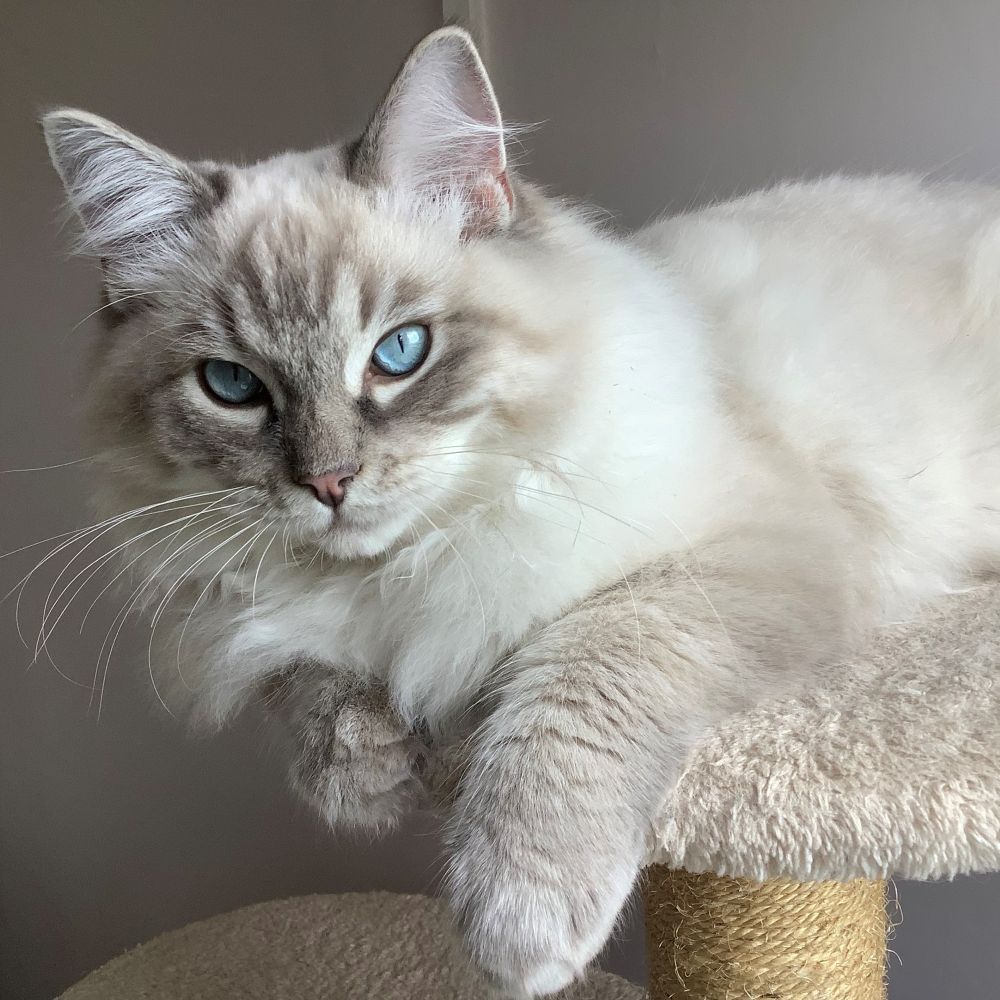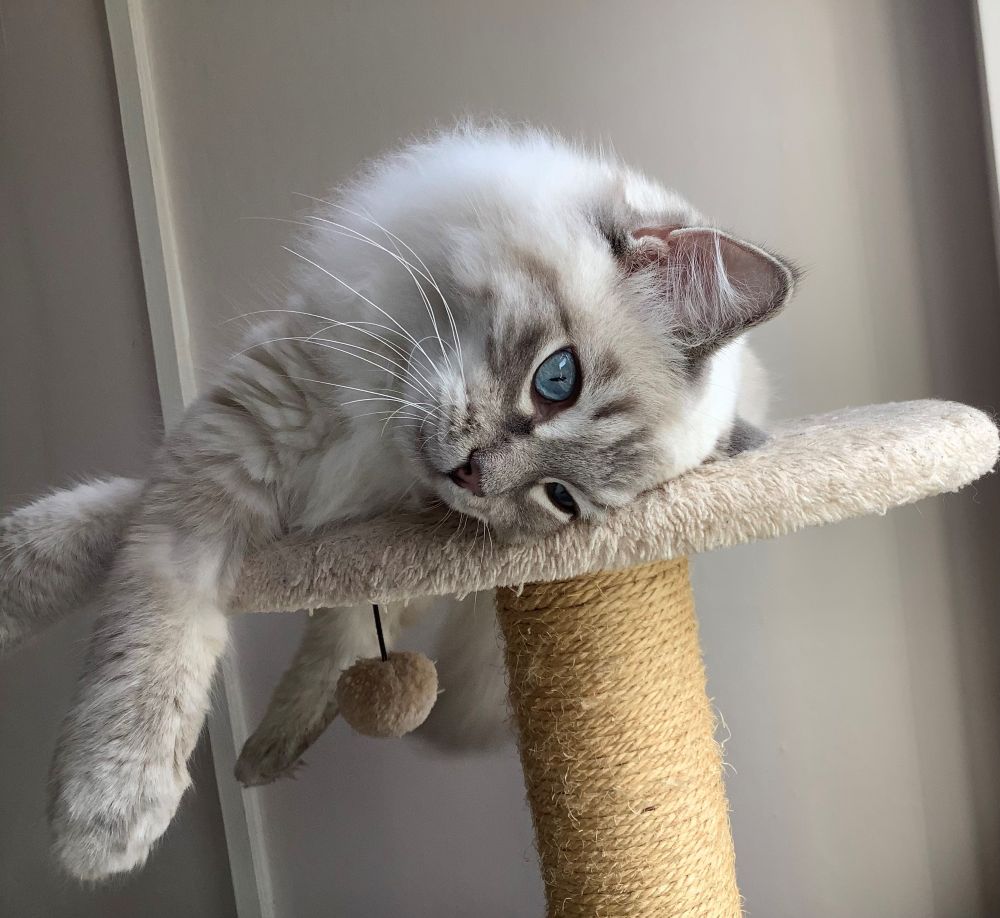The cat’s out of the bag: New RVC research reveals most common health disorders in popular Ragdoll cats
A new study from the Royal Veterinary College’s (RVC) VetCompass programme has revealed the most common health challenges facing Ragdolls – one of the UK’s most popular cat breeds. With identified common health risks including dental disease, digestive problems and being overweight/obesity, the findings of this research will help vets, breeders and Ragdoll owners predict what problems may develop, better monitor the health of Ragdoll cats and promote earlier diagnosis.

Ragdolls are a large, semi-longhaired cat breed known for an affectionate and docile nature and distinctive appearance. While only introduced to the UK in 1981, over recent years, the Ragdoll has become an increasingly popular breed across the UK, with this study showing the breed rose from 0.7% of all cats born in 2005 to 3.7% in 2019. This fivefold increase had already made the Ragdoll the second most common purebred cat in 2019 when the study was conducted, representing 1.7% of all cats overall in the UK.
Drawing on anonymised veterinary health records from more than 1.25 million cats across the UK, the RVC researchers, led by Professor Dan O’Neill, Professor of Companion Animal Epidemiology, examined the health and lifespan of more than 21,000 Ragdoll cats under primary veterinary care during 2019.
Creating a profile for the breed, the study determined that the median adult bodyweight was 4.46 kg, with males significantly heavier (4.97 kg) than females (3.83 kg). Data from more than 125,000 bodyweight records also showed that Ragdolls gain weight rapidly during their first year and continue growing until they are around two years old – suggesting that owners should be prepared to care for the needs of a relatively large cat when they decide to own a Ragdoll.
The findings also show that 61.28% of Ragdolls from this cohort of cats under veterinary care had at least one health disorder recorded during 2019. From these cats, the records analysed revealed the most common disorders in the breed included periodontal disease (8.84%); diarrhoea (7.11%); obesity (6.91%); and overgrown nails (5.68%).
Additional findings include that:
- Among the 32 most common disorders, females had statistically significantly higher probability of postoperative wound complications and ear discharge, while males had statistically significantly higher probability of being overweight/obesity.
- Ragdolls may be predisposed to digestive disorders, possibly linked to higher rates of feline coronavirus exposure noted in earlier studies.
- The median age at death overall was 12.85 years, with life expectancy not differing statistically between females and males.
- The most common causes of death were kidney disorders (21%) and poor quality of life (13%) which are common causes of death also in cats overall.
- The risk of almost all disorders rose dramatically when the Ragdolls turned 12 years old, so owners of older Ragdolls need to pay extra attention to good health care.
By highlighting the conditions that occur most frequently in Ragdolls, this study provides a clear evidence base to support more targeted health monitoring, earlier diagnosis and improved preventive care. This information can also guide responsible breeding decisions and help owners adopt a lifestyle for their cat that promotes a healthy bodyweight and regular dental care.
Professor Dan O’Neill, Professor in Companion Animal Epidemiology at the RVC, said:

“The Ragdoll has a growing reputation as a good option for owners seeking to own a pure breed cat but owning any type of cat brings big responsibilities. The results show that pure breed Ragdoll cats live as long as their random-bred ‘moggie’ cousins and that owners similarly need to ensure good dental care, flea treatment, nail care and weight control but the Ragdolls need more grooming care.”
Steve Crow, Chair of General Council of the Cat Fancy (GCCF), said:
"GCCF welcomes this positive, evidence-based research on the Ragdoll breed. As highlighted in our breed profile, the Ragdoll’s calm, sociable nature and balanced conformation reflect the best of responsible breeding and thoughtful care. It’s heartening to see scientific research reinforcing what many breeders and owners already know – that with responsible breeding and good welfare practices, pedigree cats can enjoy excellent health and quality of life.”
Alison Richards, Chief Veterinary Officer at Cats Protection, said:
“Cats Protection are great supporters of research like this taking place. The examination of data around the pedigree cat population and more specifically their expected health challenges, builds a deeper understanding of these breeds, allowing us to better support these cats and their owners. It helps organisations such as Cats Protection understand the impact of growing numbers of breeds such as the Ragdoll and how this links to the health and wellbeing of the wider cat population.”
Link to infographic: Ragdoll cats in the UK: Demography, Common disorders and Mortality
Notes to Editors
Reference
Dan G. O’Neill, Olivia Bass, Dave C. Brodbelt, David B. Church and Karolina S. Engdahl. (2025) Demography, common disorders, cause-specific mortality and life expectancy of Ragdoll cats under primary veterinary care during 2019 in the UK. Companion Animal Health and Genetics.
The full paper is available at: https://doi.org/10.1186/s40575-025-00148-9
For media enquiries, please contact:
- rvc@plmr.co.uk
- Press Line: 0800 368 9520
About the RVC
- The Royal Veterinary College (RVC) is the UK's largest and longest established independent veterinary school and is a Member Institution of the University of London.
- It is one of the few veterinary schools in the world that hold accreditations from the RCVS in the UK (with associated recognition from the AVBC for Australasia, the VCI for Ireland and the SAVC for South Africa), the EAEVE in the EU, and AVMA in the USA and Canada.
- The RVC is ranked as the top veterinary school in the world in the QS World University Rankings by subject, 2025.
- The RVC offers undergraduate and postgraduate programmes in veterinary medicine, veterinary nursing and biological sciences.
- The RVC is a research-led institution, with 88% of its research rated as internationally excellent or world class in the Research Excellence Framework 2021.
- The RVC provides animal owners and the veterinary profession with access to expert veterinary care and advice through its teaching hospitals and first opinion practices in London and Hertfordshire.
You may also be interested in:
-
A painful tail: RVC research reveals which dogs have greatest risk of a tail injury
A new study from the Royal Veterinary College (RVC) has found that the Boxer, English Springer …


